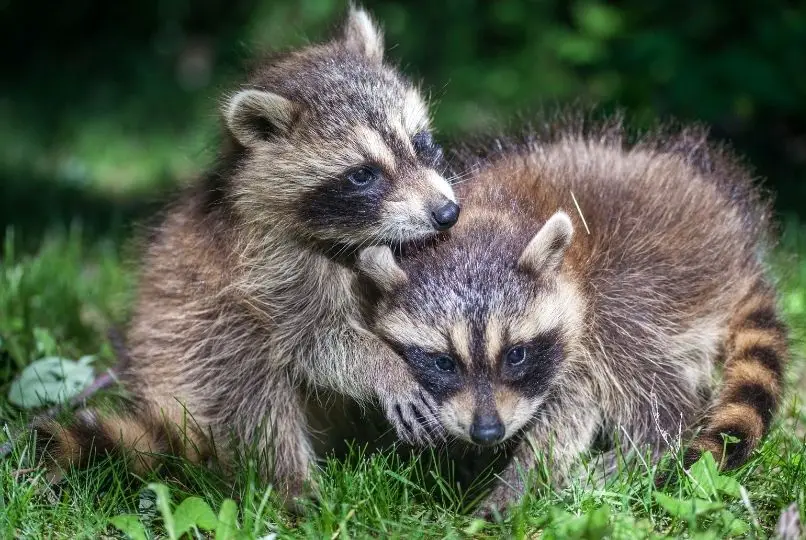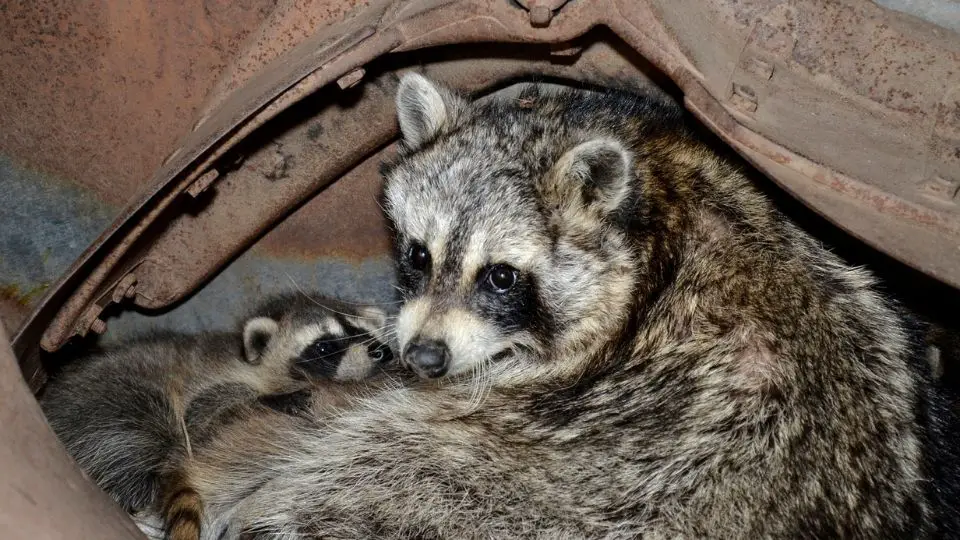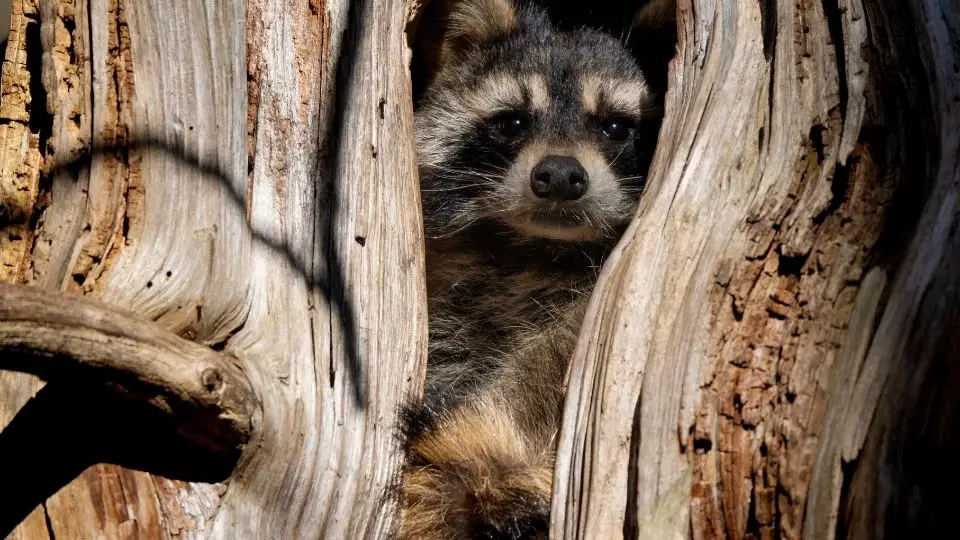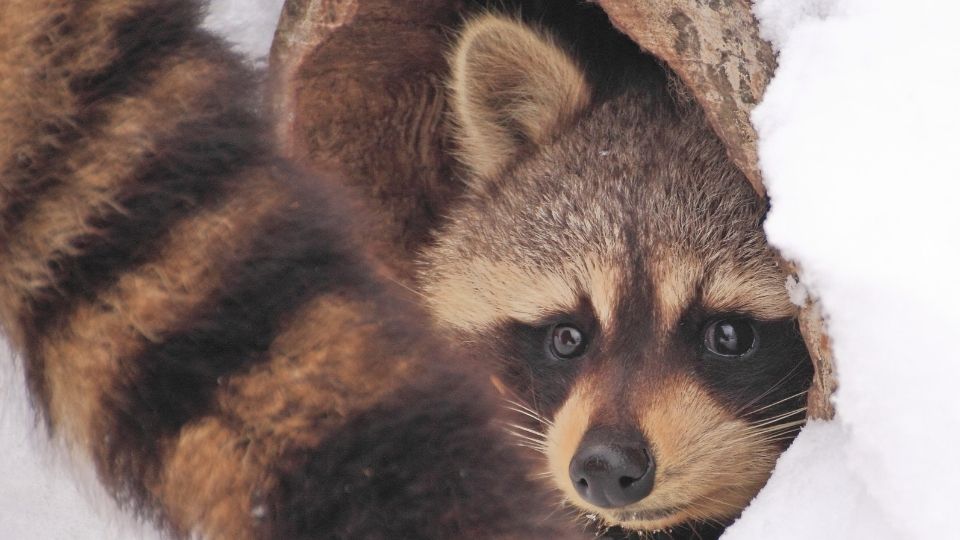Raccoons are vocal animals that make a variety of sounds. Raccoons can create more than two hundred different sounds, including barking, chittering, squeaking and growling.
Raccoons will often combine different sounds to send a specific message. They also use facial and physical cues to express their feelings. Note raccoon is sometimes misspelled as “racoon.”
Here are some notable and commonly heard sounds from raccoons:
- Growling
- Hissing
- Chittering
- Barking
- Purring
- Squeaking
- Whistling
- Screeching
- Whining
If a raccoon has the rabies virus, it will emit strange sounds. Rabid raccoons produce high-pitched squeals and screams. These sounds express pain, confusion, and discomfort. They may also make these sounds for no apparent reason.
Table of Contents
What does a baby raccoon sound like?
Newborn raccoons make chittering and chirping noises. They sound similar to birds and usually make these noises to cry for food. Baby raccoons also produce faint whining and whistling sounds.
Just as cats purr, baby raccoons make purring sounds while with their mother. They often make this sound when the mother raccoon holds and licks them.

What do different raccoon sounds mean?
Raccoons make sounds for different reasons. The main reasons are when they are protecting their territory and babies, mating, and communicating with each other.
When a mother raccoon is chittering, she is calming down her babies, called kits. Chittering sounds like a combination of purring and clicking. The baby raccoons will repeat the sound to their mother when they feel better.
If a raccoon is chittering without babies nearby, it means they are nervous, scared, or uncomfortable. Female raccoons will also chitter during mating season to let the males know they are ready to mate.
Raccoons use a combination of growling and barking sounds to communicate excitement or stress. The context of what the raccoon is doing determines what the sound means.
For instance, if the raccoon is eating, it may growl and bark in excitement for its meal. If the raccoon feels threatened by a predator, it may growl and bark to tell the predator to back off.
Raccoons bark, a noise that sounds similar to a dog barking. This vocalization tells other animals that they are approaching the raccoon’s territory. The barking could also symbolize pain or discomfort.
Adult raccoons can purr just like baby raccoons. In general, purring communicates happiness and satisfaction. Mother raccoons purr while showing affection to her cubs. Male raccoons can also purr when they are happy.
A raccoon will hiss when it feels threatened. Raccoons hiss at each other and other animals. The hissing is a warning that they will attack if the other animal does not back off. The hissing sound is often accompanied by teeth and claw barring, stiff posture, and raised fur.
Whistling is a way for raccoons to communicate with each other. This vocalization sounds similar to an owl. Baby raccoons whistle more frequently than adult raccoons.

Do raccoons make sounds at night?
Raccoons are most likely to be heard at night since they are nocturnal animals. Their screams are so loud that they can be heard inside a house with all the windows and doors shut.
Even though raccoon vocalizations can be heard during the day, raccoon noises are often heard at night while searching for food. Foraging for food at night is safer because fewer predators are around.
Homeowners may hear raccoons knocking over or rummaging through trash cans. Raccoons may also be heard as they climb walls to find entry points into homes.
Do raccoons scream at night?
Raccoon screams are also known as screeches. This sound conveys distress, fear, and panic. They usually feel this way when threatened by a predator.
Their screeches are high-pitched and loud. Raccoons will also scream while fighting with each other. Raccoons fight over territory, food, and males fight over females.
Screaming often indicates fighting or stress, but not always. Occasionally, raccoons screech to call each other and identify one another’s locations. They also may use screams as mating calls.
Do raccoons make a grunting noise?
Raccoons make grunting noises but are often so quiet and low-pitched that humans don’t hear them. These sounds can be made when the raccoon feels content and relaxed.
Raccoons also can grunt while searching for food. If a raccoon emits an audible grunt, it means they are trying to communicate its presence.

What does a raccoon sound like in an attic, garage, or basement?
Raccoons enter homes for shelter and warmth. Raccoons are noisy and are relatively big compared to other pests that may enter your home. If baby raccoons are in your home, you will hear screeching as the mother calls for her babies.
While raccoons are moving inside your home, they will make scratching, tapping, scurrying, and thumping sounds with their bodies. You will hear their thudding steps as they roam throughout the area.
Raccoon movement creates noises while they make a nest out of insulation, ductwork, or beams. They may make gnawing sounds while they chew on wood to create dens or to make entry holes bigger.
You can hear them scratching and running around at drywall if they are in the attic. You may also occasionally hear vocalizations such as chattering noises. These sounds will seem to be coming from the ceiling.
Having a raccoon infestation is dangerous to you and your home. Contact wildlife removal as soon as you hear raccoon noises coming from inside your house.

